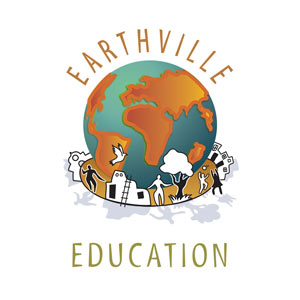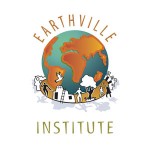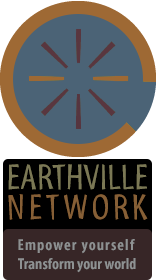 Earthville Education is developing a model for an international network of holistic centers for learning, service, and sustainable livelihoods. This vision comprises a hybrid institutional model combining two main elements — a highly experiential and service-oriented kind of “school” (in a broad sense of the word), and an innovative approach to social and environmental charitable programs — integrating the two very closely. These two main elements are supported by a third component: sustainable, socially responsible, program-related business activities that generate revenue to enable these centers to become financially self-sustaining with the flexibility to provide free and scholarship-driven programs and services to those in need, while creating jobs and improving lives and communities in the process.
Earthville Education is developing a model for an international network of holistic centers for learning, service, and sustainable livelihoods. This vision comprises a hybrid institutional model combining two main elements — a highly experiential and service-oriented kind of “school” (in a broad sense of the word), and an innovative approach to social and environmental charitable programs — integrating the two very closely. These two main elements are supported by a third component: sustainable, socially responsible, program-related business activities that generate revenue to enable these centers to become financially self-sustaining with the flexibility to provide free and scholarship-driven programs and services to those in need, while creating jobs and improving lives and communities in the process.
This model includes both “hardware” and “software,” the hardware being place-based campuses that would serve as models of sustainable facilities and planning that catalyze engagement for learners and the surrounding community, and the software being a combination of culture, philosophy, curricula, and activities that foster our educational goals of responsible global citizenship, sustainable thriving, holistic personal development, and compassionate creativity.
Development Roadmap
The development of this long-term, big-picture vision is proceeding in five stages, of which the first has been completed and the second is in active development.
Stage 1 — Pilot Campus: The Dharmalaya Institute
Earthville pilot campus, the Dharmalaya Institute for Compassionate Living in the Indian Himalayas, serves as an incubator and initial proving ground for Earthville’s evolving model of holistic campuses for learning, service, and sustainable livelihoods. (For more information, see the Dharmalaya page.)
Status: Launched. Began construction in 2010; commenced service-learning programs in 2011; completed first building and launched expanded educational programs in 2013.
Stage 2 — Program Development & Capacity-Building
Multi-year project to develop integrated programmatic model and materials (spanning curricula, culture, philosophy, experiential activities, charitable programs, strategic partnerships, and win-win community relationships) and build strategic partnerships and community relationships.
Status: Active development and field testing. Significant wealth of material created, now testing in practice and refining in preparation for publication. Began cultivating strategic partnerships in 2011 and now accelerating this process. Planning for fundraising in 2014-2015.
Stage 3 — US Model Campus: The Earthville Institute
The successes and refinements drawn from our experience with the pilot campus (stage 1 above) will be applied in our development of the first model campus in the USA, the “Earthville Institute” (see below). This institute will deliver broader programmatic scope than the pilot campus, incorporating a more complete expression of the Earthville Education model, and will operate on a larger scale. The model campus in the US would also make the most of close programatic links with the pilot campus in India, leveraging opportunities for exchange and cross-pollination (For an overview of the proposed Earthville Institute, see this page.)
Status: Preparatory stages. Began gradual conceptual development in 1992; launched pilot campus as proof of concept 2010-2013; planning to begin fundraising for model institute (first US campus) in 2014-2016.
Stage 4 — Performance Refinement & Partnership Expansion
After launching the model institute (stage 3 above), we intend to spend a number of years focusing intensively on fine-tuning its programs (pursuing excellence in achieving its objectives), cultivating its community relationships and strategic partnerships, and building its capacity to achieve results at the desired level before proceeding to the next step of expansion.
Status: Awaiting launch of the model institute (stage 3 above); meanwhile, ongoing networking with an eye for potential partnerships.
Stage 5 — Global Campus
Once the model institute (stage 3 above) is functioning optimally, and as the capacity of both the Earthville Network and its key partners reaches certain milestones enabling further expansion, we envision proceeding to establish additional Earthville Institutes (or similar models, by whatever name) in other locations while continually cultivating a gradually broadening network strategic partnerships and community relationships, collaborating in a very long-term process of knitting these numerous and complementary mission-aligned institutions and organizations into a “global campus.” This global campus will incorporate both place-based activities spread across the globe and trans-geographic activities (e.g. exchanges, distance learning, technological programs, non-place-bound communities of purpose, etc.). The evolving campus will provide people worldwide with an increasingly rich diversity of opportunities for learning, service, and careers oriented toward public and planetary benefit.
As we envision it, the global campus (when sufficiently developed) would serve as a worldwide (multi-location and trans-geographic) “opportunity matrix” aggregating myriad possibilities for learning, service, and sustainable livelihoods and presenting these opportunities to the public via numerous access points (both virtual and place-based) collectively comprising a user-friendly interface, making the opportunities easily understood and readily utilized by a great diversity of people in many locations. In other words, the ideal is that ultimately almost anyone, almost anywhere, could reasonably easily ascertain what learning/service/work opportunities within that global campus would be available and accessible to her (depending on her circumstances, e.g. her location, her ability to travel, or her access to technology), and would find it relatively straightforward to plug in participate in whichever opportunities are interesting and accessible to her.
The global campus will not be an “Earthville Network project” as such: The undertaking is far too big to be created or managed by any one entity, and would not likely thrive under a centralized administration. Rather, the concept is well suited to a distributed network model (analogous to the way the Internet is organized), operating as a collaborative effort of numerous partners (e.g. educational institutions and learning communities, charitable organizations, responsible businesses, public institutions, and other partners with compatible and complementary missions and objectives), with each “node” in the network (each individual partner entity) remaining autonomous and only contributing to the collective effort of organizing and improving the system as and when they see fit (lowering the barrier to participation and minimizing the risk of taxing the resources of partner entities). It is presumed that, for practical reasons, this campus would begin as a relatively loose network of affiliations (building upon existing alliances between various entities and adding new ones) that would become gradually more organized and integrated over time. Earthville would be one of the partners interested not only in the level of individual locations and programs but also the “meta level”: proactively orchestrating the networking of these various nodes of activity and opportunity in ways that become both increasingly useful (in achieving real results) and increasingly efficient and manageable, optimizing the system for win-win synergies and low administrative overhead with the goal that a given partner would have much more to gain by participating in the larger network than they might lose from the extra effort and expense of participating in it. Likewise, Earthville would be one of the partners interested in the refinement of the “user interface” of this network so that people around the world of diverse backgrounds would find it as easy as possible to understand and participate with the best possible results.
Status: Countless people and organizations around the world have been thinking along these lines and working in this direction, starting decades ago. Many groups have been forming various kinds of alliances in a similar spirit on a comparatively modest scale, but the kind of broad and well-orchestrated network that we are describing here (operating usefully as a multi-location and trans-geographic “campus” for learning, service, and sustainable livelihoods that is easily understood and readily utilized by a great diversity of people in many locations) does not yet exist. Development and refinement of this global campus will take decades, even once numerous capable partners are actively coordinating, but we see it as an obvious development in the age of globalization, a potential extraordinary win-win, and an inevitable eventuality.
Development Strategy
To preserve focus and effectiveness, Earthville is pursuing the objectives on this roadmap with a “tick-tock” strategy, in which the focus alternates between steps advancing Earthville’s own campuses and steps expanding our partnerships, extending our effective virtual campuses to include our partners and communities on an incrementally broadening scale. First we developed our pilot campus (the “tick”), and then we turned our focus toward building relationships between that campus and its surrounding community and forging strategic alliances with other organizations furthering our shared objectives in that area (the “tock”). We intend to repeat that tick-tock strategy at the next stages when we launch the model campus in the US and then turn our focus toward expanding its relationships and reach. Likewise, when we attain the capacity to establish Earthville Institutes in additional locations, the same strategy will be repeated as we collaborate with partners to grow a “global campus” through a combination of Earthville’s own institutes and the various facilities and activities of our partners and communities worldwide.
For an introduction to the vision for the first model campus in the US, see below.
The Earthville Institute
(Proposed US Campus)
 The Earthville Network aspires to establish an Earthville Institute in the US. The focus of the Institute’s activities would be education, training, research, and charitable programs for sustainable living and compassionate global society, embodied in an innovative hybrid organizational model for learning, service, and social-benefit employment. We have an inspiring vision for the Institute and a great network of potential partners, and the project is now seeking funding to take it to the next stage. › more
The Earthville Network aspires to establish an Earthville Institute in the US. The focus of the Institute’s activities would be education, training, research, and charitable programs for sustainable living and compassionate global society, embodied in an innovative hybrid organizational model for learning, service, and social-benefit employment. We have an inspiring vision for the Institute and a great network of potential partners, and the project is now seeking funding to take it to the next stage. › more
Got ideas? We’re listening. Feel free to post thoughts or questions relevant to Earthville Education’s long-term vision and the global campus in the comments section below.
Get Involved
There are several ways you can participate in the Earthville Education initiative and make your unique contributions to this exciting project:
- Join the Earthville Network to become an active member of the community → sign up
- Subscribe to the Earthville Education Blog and join the conversation by posting comments in the articles that interest you or submitting articles of your own → go
- Participate in Earthville’s educational programs and events → see event calendar
- Apply to volunteer for the Earthville Education initiative, and we’ll let you know when we’re ready to call you into action. → apply now
- Visit the Dharmalaya Institute in the Indian Himalayas to volunteer or participate in service-learning programs or retreats → jump to the Dharmalaya website
- Help us establish the Earthville Institute in the US by making a tax-deductible gift or bequest → more info

No comments yet.